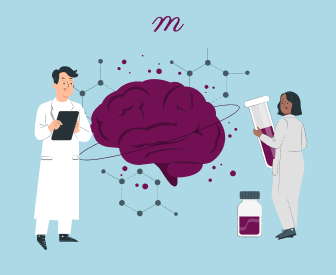Have your progress notes written for you automatically
Are you looking to revolutionize your client assessments? Introducing the Daily Living Activities-20 (DLA-20)! This powerful tool is renowned for its convenience, reliability, and effortless scoring, making your assessment, treatment planning, and tracking a walk in the park. Whether you're in community mental health or private practice, the DLA-20 is a game-changer. Our comprehensive guide will illuminate the vital role of the DLA-20 in adult mental health and show you how to integrate it into your treatment planning seamlessly. Let's unlock the potential of daily living activities and witness firsthand why this functional assessment is a game-changer for mental health providers like you!
The Importance of Daily Living Activities in Adult Mental Health
Mastering daily living activities is crucial for maintaining overall well-being. These tasks, such as eating, dressing, bathing, and managing finances, may seem routine, but they play a vital role in mental health. Completing these activities independently and effectively boosts self-esteem and independence. However, struggling with these tasks can lead to feelings of frustration and helplessness and may even contribute to mental health disorders such as depression and anxiety.
Demystifying the DLA-20 Tool: Its Users and Significance
The DLA-20 is crucial in mental health care settings, including hospitals, rehabilitation centers, and long-term care facilities. It is an invaluable tool for mental health professionals such as therapists, counselors, psychiatrists, psychologists, and social workers, as it helps clients maintain their self-care and life skills. This assessment tool covers health practices, household responsibilities, communication, safety skills, time management, nutrition, relationships, substance use, sexual health, and personal hygiene.
By evaluating these aspects, professionals can gain insights into their clients' basic needs and the effectiveness of symptom management, leading to better treatment and support. It is a valuable resource for understanding an individual's overall functioning and identifying areas that may require intervention. Timely identification of cognitive decline and providing support is crucial.
Moreover, the DLA-20 can encourage clients to establish and achieve recovery goals, providing an objective measure of progress over time. This supports treatment planning, justifies the level of care, and demonstrates outcomes to insurance companies or accrediting bodies. By focusing on daily living skills and coping strategies, the DLA-20 supports clients in maintaining stability and independence post-transition from the care of their mental health professional.
Areas Covered and Sample Questions:
Here are some examples of what to expect when administering the DLA-20:
Health Practices and Self-Care
The assessment evaluates whether you receive regular medical checkups, take prescribed medications as directed, and avoid harmful substances. The self-care domain assesses your ability to perform basic personal care tasks, such as bathing, dressing, and feeding yourself.
For example, it may ask:
Do you get a physical exam by a doctor at least once a year?
Do you take medications as prescribed by your doctor?
Safety and Mobility
This area considers risks like falls, accidents, and self-harm. The mobility domain assesses your ability to move around and perform physical activities, such as walking, standing, and transferring from one surface to another.
Questions may include:
Do you have working smoke detectors in your home?
Do you always wear a seat belt when traveling in a vehicle?
Managing Time
The DLA-20 assesses skills such as punctuality, completing tasks, and participating in social activities.
For example:
Do you arrive at work or school on time?
Do you pay your bills on time?
Nutrition
This part evaluates whether you maintain a healthy diet, cook meals at home, and limit your junk food or snack consumption.
Questions may include:
Do you have 2-3 nutritious meals per day?
Do you limit your consumption of sugary, fatty, or salty foods to twice a week or less?
Implementing the DLA-20: Training, Billing, and Administering the DLA-20 Assessment
When incorporating the DLA-20 into your practice, you must undergo specialized training in administering and interpreting the assessment. Typically, practitioners undergo a certification program to ensure they have the necessary knowledge and skills. These programs are designed to give practitioners a deep understanding of the DLA-20, including its purpose, structure, administration, scoring, result interpretation, treatment plan development, and communication of results to patients and other healthcare professionals. Upon program completion, practitioners may also need to pass a competency exam to demonstrate their proficiency.
Billing for the DLA-20 will vary depending on your practice setting. In private practice, you can bill insurance companies to administer the assessment, but it's essential to check with specific insurance providers for coverage and rates in your area. In other settings, such as community mental health clinics, the cost of the DLA-20 may already be covered.
Creating a supportive and non-judgmental environment in your office is crucial for individuals to feel comfortable sharing their experiences during the evaluation process. Presenting each activity individually and asking the individual to rate their difficulty in performing it can help in this process. Throughout the evaluation, providing support and reassurance and encouraging clients to express their challenges is vital. It's important to remind clients to approach the DLA-20 assessment with an open and honest mindset; the more accurate information they provide, the better support they can receive. The benefits of improved daily functioning and quality of life make the extra effort worthwhile.
Scoring Methodology and Interpreting The DLA-20 Results
The DLA-20 assessment is a valuable tool that involves a private, one-on-one interview. During this assessment, individuals rate their difficulty performing each activity on a scale from 0 to 2. A score of 0 means the individual can perform the activity independently without any impairment, 1 indicates mild impairment, and 2 means the individual cannot perform the activity due to severe impairment.
After completing the DLA-20 assessment, the scores for each activity are tallied to provide an overall measure of an individual's daily living activities skills. These scores are interpreted as follows: higher scores suggest significant difficulty performing daily activities, indicating a need for intervention and support. In contrast, lower scores indicate higher levels of independence and functioning. Integrating DLA-20 scores with other clinical assessments and observations is essential to comprehensively understand an individual's overall functioning and tailor treatment plans accordingly. These results are pivotal in shaping treatment strategies that enhance life skills, health, safety, relationships, and overall well-being.
Incorporating DLA-20 into Treatment Planning
The DLA-20 assessment provides valuable insights that can help tailor treatment for individuals dealing with mental health issues. By identifying specific areas of challenge in their daily living activities, mental health professionals can create targeted interventions to enhance functioning and overall well-being. These interventions may include skill-building exercises, counseling, occupational therapy, or referrals to community resources. Additionally, the DLA-20 assessment serves as a starting point to track progress. Regularly reassessing an individual's daily living activities skills allows mental health professionals to gauge the effectiveness of interventions and make necessary adjustments to treatment plans. This ongoing assessment ensures that the individual's needs are met and they receive continuous support in their journey toward improved daily living activities and skills.
Best Practices for Implementing the DLA-20
Effectively implementing the DLA-20 in your practice can result in tailored treatment plans and improved client outcomes. With the proper training and tools, the DLA-20 has the potential to elevate your practice to new heights.
To ensure your success, consider the following best practices:
Choose the Appropriate Version:
Select the DLA-20 version that aligns with your client's age group and abilities. While the standard adult version is suitable for most clients, there are also versions available for adolescents, older adults, and individuals with intellectual disabilities.
Explain the Purpose:
Explain to your client why you use the DLA-20 and how it will help shape their treatment plan. Inform them that the assessment covers daily activities and functions to understand their situation comprehensively.
Allocate Sufficient Time:
Dedicate 30-45 minutes to administer the DLA-20 properly. This timeframe allows you to provide instructions, enable the client to complete the assessment, and review and score their responses.
Review and Score Responses:
Thoroughly assess your client's responses to each question and score them according to the DLA-20 guidelines. Aggregate the results to identify areas of strength and areas requiring support.
Utilize the DLA-20 results to establish specific, measurable treatment goals to enhance daily functioning. Periodically readminister the DLA-20 to monitor progress and make any necessary adjustments.
Tips for Improving Daily Living Activities Skills
Here are some valuable tips to support your client in improving their daily living skills:
Break tasks into smaller steps:
By breaking down complex tasks into smaller, manageable steps, your client can confidently approach them and increase their chances of successful completion.
Practice regularly:
Consistent training is critical to enhancing daily living skills. Encourage your client to practice regularly to refine their techniques and make tasks easier over time.
Seek assistance when needed:
It's important to recognize when assistance is necessary and to ask for help. Remind your client that seeking support from a friend, family member, or healthcare professional can significantly improve their ability to manage daily living activities.
Remember, progress takes time and patience. Celebrate minor achievements with your client and recognize their efforts to enhance their daily living skills.
Conclusion
The DLA-20 is an incredible assessment tool that will revolutionize how you approach treatment planning and track progress. It is a powerful tool for gaining insights into your clients' needs, progress, and outcomes throughout treatment. By consistently using this assessment, you can better understand how well your clients can care for themselves and maintain stability in their daily lives. Incorporating the DLA-20 into your practice will elevate your mental health care and take your practice to the next level. Completing the training will empower you to unlock the full potential of this transformative tool, leading to more effective care plans and interventions supported by objective data. Gain invaluable insights into your clients' daily living skills and become a master of daily living activities, guiding your clients toward better mental health. Witness the impact of the DLA-20 on treatment planning and interventions, and offer targeted support and interventions to enhance daily living activities. Progress takes time and effort, but with the DLA-20, you'll celebrate each step forward in no time.
Discover how Mentalyc, a HIPAA-certified AI software, can transform your documentation process and enhance how you create progress notes. Join us in our mission to streamline your practice for greater efficiency today!
DLA-20 FAQs: Your Top Questions Answered
The DLA-20 is a comprehensive tool, so you likely have questions about using it in your practice. Here are answers to some of the most frequently asked questions about this assessment.
Which clinicians can utilize the DLA-20?
The DLA-20 is suitable for behavioral health clinicians, such as therapists, counselors, social workers, and case managers, to evaluate clients' capability in performing daily living activities, specifically in outpatient community mental health settings.
What aspects of functioning does the DLA-20 assess?
The DLA-20 assesses ten domains of daily functioning, including health practices, household responsibilities, communication, safety, time management, nutrition, relationships, substance use, sexual health, and self-care. It prompts clients to rate their performance in specific activities over the past month.
How long does it take to complete the DLA-20?
Typically, clients take 10 to 15 minutes to complete the self-report form. Clinicians should allocate at least 15 minutes to review and score each assessment. The brevity of the evaluation makes it ideal for regular reassessment to monitor changes over time.
Is special training necessary to use the DLA-20?
Yes. Special training is essential for administering the DLA-20. Behavioral health care providers must complete a 3.5-hour training before they can start using it. This training has been developed to ensure that all professionals thoroughly understand the assessment process and the necessary skills to score and interpret the results accurately.
Can I bill for DLA-20 assessments?
Yes, the time spent conducting, scoring, and reviewing DLA-20 assessments may be billable. Moreover, the DLA-20 can provide evidence to justify medical necessity for services. It's advisable to consult your insurance providers and billing policies for specific details on utilizing functional assessments.
Resources:
Edemekon, P. F., Bomgaars, D. L., Sukumaran, S., & Schoo, C. (2023, June 26). Activities of Daily Living. National Center for Biotechnology Information. https://www.ncbi.nlm.nih.gov/books/NBK470404/
Jensen, A., & Huber, S. (n.d.). Using the DLA-20 to Measure Outcomes. MTM Services. https://www.mtmservices.org/dla
Missouri Department of Mental Health. (n.d.). Daily Living Activities Questions & Answers. dmh.mo.gov. https://dmh.mo.gov/media/pdf/daily-living-activities-questions-answers










